Personality formation refers to developing patterns in thoughts, feelings, and behaviors that make a person unique. Understanding the various theories of personality formation helps us grasp how personalities are shaped and why individuals behave differently in similar situations.
I. Understanding Personality Formation
Personality formation is the process through which a person's distinct personality traits develop. These traits influence how individuals interact with the world and respond to different situations. Multiple theories explain how personality is formed, each offering unique insights.
Key Concepts
- Personality Traits: These are consistent patterns in how people think, feel, and behave. For example, being shy, outgoing, or curious are different personality traits.
- Development: The changes in personality traits that occur over a person's lifetime. This includes how life experiences and environment influence traits.
- Influences: Factors contributing to personality development, such as genetics, environment, and experiences. For instance, growing up in a supportive family might encourage a person to be more confident.
II. Major Theories of Personality Formation
Several major theories explain how personality develops. These theories often focus on different aspects, such as biological, social, or psychological factors.
Psychoanalytic Theory
Psychoanalytic theory, developed by Sigmund Freud, emphasizes the influence of the unconscious mind and childhood experiences on personality.
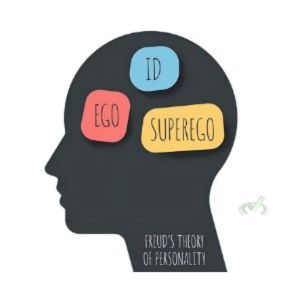
- Id, Ego, and Superego: According to Freud, personality consists of three parts:
- Id: The unconscious part that seeks immediate gratification, like wanting to eat a snack right away even if it's not meal time.
- Ego: The rational part that deals with reality, like deciding to wait until dinner because it's healthier.
- Superego: The moral conscience that internalizes societal norms, like feeling guilty for wanting to eat a snack before dinner.
- Psychosexual Stages: Freud proposed that personality develops through stages focused on different pleasure areas of the body. These stages are oral, anal, phallic, latency, and genital. For example, a person fixated on the oral stage might develop habits like smoking or nail-biting.
Humanistic Theory
Humanistic theory focuses on personal growth and self-fulfillment. Key figures include Carl Rogers and Abraham Maslow.
- Self-Actualization: The realization of one's full potential. Maslow's hierarchy of needs states that basic needs, like food and safety, must be met before reaching self-actualization. This includes being creative and independent.

- Unconditional Positive Regard: Rogers emphasized the importance of receiving unconditional positive regard from others for healthy personality development. This means being accepted and loved without conditions like parents loving their child no matter what.

Trait Theory
Trait theory examines the identification and measurement of personality traits.
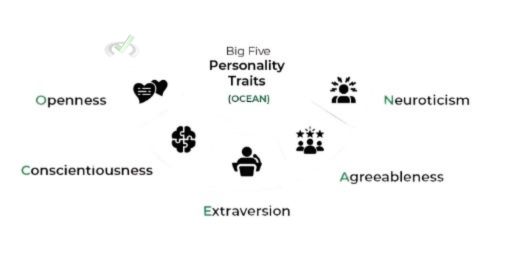
- Big Five Personality Traits: The most accepted model, also known as the Five Factor Model, includes:
- Openness to Experience: Creativity and willingness to try new things. For example, someone who is highly open might enjoy traveling and learning about new cultures.
- Conscientiousness: Being organized, responsible, and reliable. People high in this trait tend to be punctual and hardworking.
- Extraversion: Being outgoing and energetic. Extraverts enjoy socializing and often have a lot of friends.
- Agreeableness: Being cooperative and compassionate. Agreeable individuals are often kind and helpful.
- Neuroticism: The tendency of a person to experience negative emotions like anxiety and anger. People high in neuroticism may be more prone to stress.
Social Cognitive Theory
Social cognitive theory emphasizes the influence of observing others, self-efficacy, and situational factors.
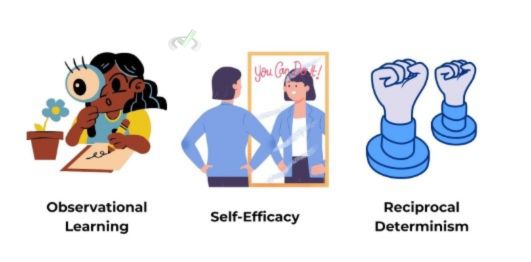
- Observational Learning: We learn behaviors by watching others, as shown in Albert Bandura's Bobo doll experiment, where children mimicked aggressive behavior they saw.
- Self-Efficacy: The belief in one's ability to succeed in specific situations. For example, a student with high self-efficacy in math will feel confident about solving math problems.
- Reciprocal Determinism: Bandura proposed that the interaction of behavior, personal factors, and the environment shapes personality. For instance, a person’s friendliness (behavior) can lead to positive responses from others (environment), reinforcing their friendly nature.
Biological Theory
Biological theory looks at the genetic and biological processes that influence personality.
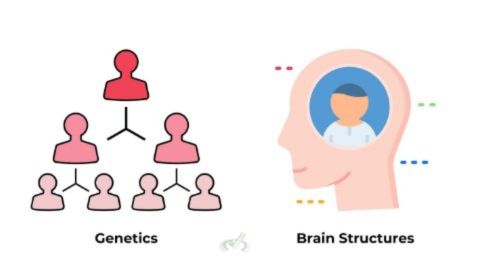
- Genetics: Research suggests that genetic factors contribute significantly to personality traits. For example, studies on twins have shown that identical twins have more similar personalities than fraternal twins.
- Brain Structures: Certain areas of the brain are associated with specific traits. For example, the amygdala is linked to emotional responses like fear and aggression.
III. Factors Influencing Personality Formation
Several factors, including genetic, environmental, and cultural factors, influence how personalities are formed.
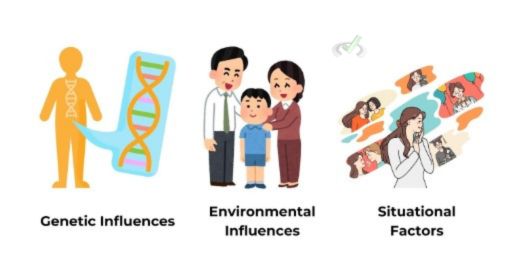
Genetic Influences
- Heredity: Personality traits can be inherited from parents. For example, if both parents are outgoing, their child might also be sociable.
Environmental Influences
- Family Environment: How a person is raised can significantly impact their personality. Parenting styles, sibling relationships, and home atmosphere all play a role. For example, an authoritative parenting style, which is supportive and sets clear boundaries, is often linked to children developing high self-esteem.
- Culture: Cultural norms and values influence personality development. For example, collectivist cultures emphasize social harmony and group needs, while individualist cultures prioritize personal achievement and independence.
Situational Factors
- Life Experiences: Significant life events, such as trauma or major accomplishments, can shape personality. For example, overcoming a challenging experience can build resilience and confidence.
IV. Assessing Personality
Personality assessment involves measuring and evaluating individual personality traits.
Personality Tests
- Self-Report Questionnaires: These include tests like the Myers-Briggs Type Indicator (MBTI) and the Minnesota Multiphasic Personality Inventory (MMPI). They are often used in counseling and job placement but have limitations, such as people not always being accurate in their self-assessment.
- Projective Tests: These tests, like the Rorschach Inkblot Test, involve ambiguous stimuli to uncover unconscious thoughts and feelings. However, they can be subjective and may lack reliability.
Observations
Observing a person's behavior in different situations can provide insights into their personality. This can be done in structured settings like a job interview and unstructured settings like a social gathering.
V. Bridge/Overlap
The study of personality formation connects to other important areas in psychology and beyond.
Mental Health
Understanding personality can help in diagnosing and treating mental health disorders. For instance, recognizing traits of anxiety or depression can lead to better treatment approaches.
Developmental Psychology
Personality development is a crucial aspect of developmental psychology, which studies how people grow and change over time. For example, children may exhibit different personality traits from childhood to adolescence.
Social Psychology
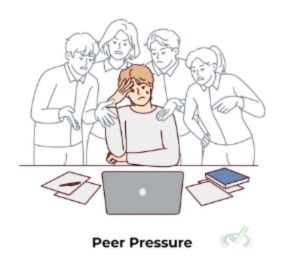
Theories of personality formation overlap with social psychology, which examines how individuals influence and are influenced by others. For example, how peer pressure can shape personality traits like conformity.
Occupational Psychology
Personality assessments are often utilized in career counseling and employee selection, as certain traits can predict job performance and satisfaction. For instance, high conscientiousness is usually linked to better job performance.
Cognitive Behavioral Therapy (CBT)
CBT often addresses maladaptive personality traits and thought patterns, helping individuals change negative behaviors and thoughts. Understanding a client's personality can help tailor the therapy to their needs.
Behavioral Economics
Personality traits can influence economic decision-making and financial behaviors. For example, impulsive individuals may have different spending habits than those who are more conscientious.
Educational Psychology

The impact of personality in learning styles and academic achievement is significant. For example, students open to new experiences may be more willing to explore diverse subjects.
Health Psychology
Personality traits influence health behaviors and outcomes. For example, conscientious individuals may be more likely to adhere to medical advice and maintain healthy lifestyles.
VI. Wrap Up/Key Terms
Let’s summarize the key points:
- Personality Traits: Consistent patterns in thoughts, feelings, and behaviors.
- Psychoanalytic Theory: Focuses on unconscious influences and childhood experiences.
- Humanistic Theory: Emphasizes personal growth and self-fulfillment.
- Trait Theory: Identifies and measures personality traits.
- Social Cognitive Theory: Focuses on observational learning and self-efficacy.
- Biological Theory: Examines genetic and biological influences on personality.
- Self-Actualization: The realization of one's full potential.
- Observational Learning: Learning behaviors by watching others.
- Reciprocal Determinism: The interaction of behavior, personal factors, and the environment in shaping personality.
- Cultural Variations: How different cultures perceive and value various personality traits.
VII. Practice
Test your understanding with these questions:
Sample Practice Question 1
According to Freud's psychoanalytic theory, what are the three personality parts?
A. Id, Ego, and Superego
B. Conscious, Preconscious, and Unconscious
C. Extraversion, Agreeableness, and Neuroticism
D. Openness, Conscientiousness, and Extraversion
Ans. A
According to Freud, the Id seeks immediate gratification, the Ego deals with reality, and the Superego represents moral conscience.
Sample Practice Question 2
What is the primary focus of humanistic theory in personality formation?
A. Unconscious conflicts
B. Personal growth and self-fulfillment
C. Genetic influences
D. Behavioral conditioning
Ans. B
Humanistic theory emphasizes achieving one's full potential and personal growth.







 To help you achieve your goal MCAT score, we take turns hosting these
To help you achieve your goal MCAT score, we take turns hosting these 
